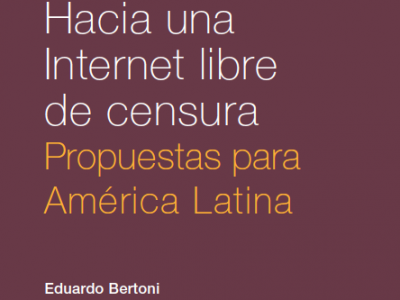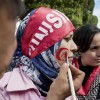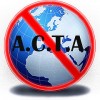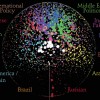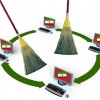Stories about Feature from January, 2012
What Does Twitter’s Country-by-Country Takedown System Mean for Freedom of Expression?
Yesterday, Twitter announced in a blog post that it was launching a system that would allow the company to take down content on a country-by-country basis, as opposed to taking it down across the Twitter system. Eva Galperin explains what the new system will, and will not, allow.
Netizen Report: Uprising Edition
Netizens around the world took collective action with a mass Internet black out on January 18th to protest the U.S. Stop Online Piracy Act (SOPA) and the Protect-IP Act. But that was not the only news in the global struggle for freedom and control on the Internet. In our latest twice-monthly report, we take a look at developments concerning netizen rights all over the world.
New Book Proposes Open Internet Policies for Latin America
Last week, the Center for the Study of Free Expression (CELE) at Argentina’s University of Palermo released a book addressing some of the most pressing challenges facing Latin American digital rights advocates today, with contributions by leading policy experts from Brazil, Chile, Colombia, Puerto Rico, and the U.S.
International Privacy Day: Fighting Data Retention Mandates Around the World
This January 28 marks International Privacy Day. Different countries around the world are celebrating this day with their own events. In EFF, we are calling on governments to repeal mandatory data retention schemes. Mandatory data retention harms individuals’ anonymity, which is crucial for whistle-blowers, investigators, journalists, and for political speech....
Poland: Government Will Sign ACTA Despite Massive Protest
Despite a massive Internet protest and controversies around the secret manner of negotiations, the Polish government will sign the anti-piracy agreement ACTA on January 26, as planned. Katarzyna Odrozek reports.
Between Twitter and the Street: Tunisia Celebrates its Second Independence
A year ago, on this same day and on this same street, Tunisians came united to shout “Dégage” (Leave), a key word of the Tunisian Revolution. Today, they come to celebrate the first anniversary of their revolution.
Poland: Netizens Protest Government's Plan To Sign ACTA Next Week
With the world still talking about the aftermath of the SOPA/PIPA Blackout Day, Polish netizens are confronted with another backstabbing development in the fight for free Internet: ACTA.
Internet Blackout Day Fires Up Digital Rights Activism Around the World
Yesterday was a defining moment for the global Internet community. The effects of the massive online blackout in protest of U.S. Internet blacklist legislation, SOPA and PIPA, were felt around the world as countless websites joined in a global action against over-broad and poorly drafted copyright laws.
U.S. Bills Could Threaten the Global Internet
At Global Voices, we understand that we, collectively, are the Internet. Our individual participation is what makes the Internet a global conversation of startling depth and variety, but this is possible only because of its open technical and legal structure. Unfortunately, there are powerful corporate and government forces who would...
Iran: Jailed Islamic Cleric and Blogger on Hunger Strike
In the last 33 years since the Islamic Revolution, Iran has been a kind of paradise for Islamic clerics who gained power and rule over the country. But not for all of them. Mohammad Sadegh (Arash) Honarvar Shojayi, a cleric and a blogger is one who is currently sharing the...
How PIPA and SOPA Violate White House Principles Supporting Free Speech and Innovation
Over the weekend, the Obama administration issued a potentially game-changing statement on the blacklist bills, saying it would oppose PIPA and SOPA as written, and drew an important line in the sand by emphasizing that it “will not support” any bill “that reduces freedom of expression, increases cybersecurity risk, or...
Venezuela: Cyberactivist Luis Carlos Díaz harassed and threatened by “hackers”
For the second time in only four months, Venezuelan journalist and cyberactivist Luis Carlos Díaz is being harassed by a so-called group of pro-government "hackers", who act under the name of N33, and who in previous months have hacked into the Twitter and e-mail accounts of about thirty different Venezuelan personalities, including journalists Sebastiana Barráez, Ibéyise Pacheco, political humorist Laureano Márquez, activist Rocío San Miguel and writer Leonardo Padrón, amongst many others.
Netizen Report: Celebration Edition
In our first edition of 2012, we take a look at the mounting challenges from all directions to online free expression, and celebrate the many ways in which netizens around the world are fighting back.
Biometrics in Argentina: Mass Surveillance as a State Policy
Two years ago, the UK dismantled their national ID scheme and shredded their National Identity Registry in response to great public outcry over the privacy-invasive program. Unfortunately privacy protections have been less rosy elsewhere. In Argentina, the national ID fight was lost some time ago. A law enacted during the...
The Arms Race Over The Internet Rages Onward – part 1
2011's Chaos Computer Congress (CCC) was on his 28th edition named “Behind Enemy Lines”. The 28C3, as it is called for shortness, was thus constituted by a myriad of talks and workshops discussing what is to be behind enemy lines. To put it clearly, this idiom is quite ambiguous: for repressive governments, the freedom fighters are the enemy, and vice and versa.
2011: A Year of Triumphs and Struggle for Bloggers in the Middle East and North Africa
With all of the social media successes throughout the Middle East and North Africa in 2011, it would be all too easy to overlook the struggles faced by bloggers and netizens throughout the region. But with 126 netizens imprisoned, it would be a travesty.
Highlights from the 28th Chaos Communications Congress
The Chaos Communications Congress is the annual meetup of Germany's Chaos Computer Club, one of the oldest hacker collectives in the world. The programme mixes technical talks from the security and free software worlds with talks about online rights and hacktivism.
Will Iran Soon Have Its Own “Clean Internet”?
The Iranian regime may be losing its battle to filter content on the internet, but meanwhile it is trying news things - from slowing down internet speeds, to developing a so-called "national internet" or "clean internet".



